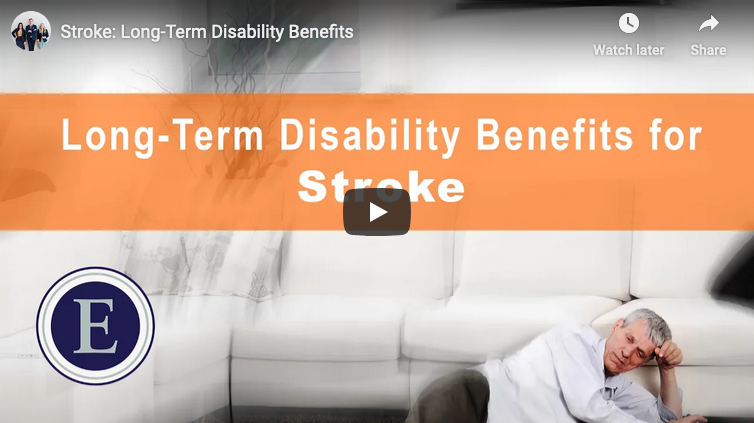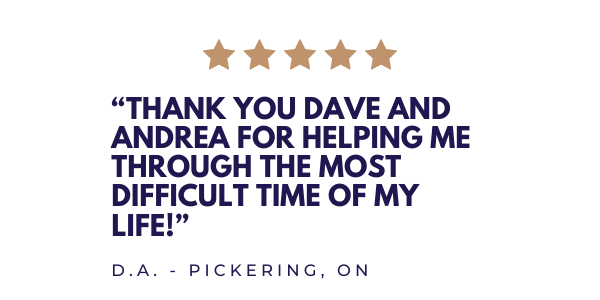Do I qualify for long-term disability benefits if I had a stroke?
Can I Get Long-Term Disability Benefits for Stroke?
One of the most common questions we get is “Do I qualify for long-term disability benefits if I have experienced a stroke?”
Stroke disability can severely limit your physical and mental abilities and profoundly affect your ability to work. In fact, only about 10% of stroke victims ever return to work.
Therefore, if you have suffered a stroke you may qualify for long-term disability benefits (also called LTD benefits) under a group or individual plan of insurance, if you have a plan. You may also be entitled to government assistance.
Ertl Lawyers helps people who are denied or cut off by insurance companies under group or individual plans of insurance.
LTD Denied? What Category Do You Fit Into?
Category 1: The insurance company has denied your claim for disability benefits for stroke.
Category 2: The insurance company has denied your appeal disability benefits.
Category 3: You received disability benefits but then the insurance company terminated those benefits.
How Can We Help?
We work with you and your physician to help challenge the insurance company’s denial or discontinuance of your long-term disability benefits.
Where necessary, we will engage other trusted professionals to support your case including specialists, functional capacity evaluators, and vocational evaluators to help credibly explain why your stroke disability symptoms are preventing you from doing your “own occupation” or “any occupation”.
We offer:
✓ A free case assessment with experienced long-term disability lawyers
✓ Fair, flexible rates, including contingency fees (i.e. only pay if you win)
✓ Service across all of Canada
If you are looking for long-term disability lawyers that care about your well-being, you’ve found us.
Our help can make all the difference.
![]()

Resource: Body and Health Canada
Type of Stroke
There are three main types of stroke:
Ischemic Stroke: caused by blockage or blood clot in your brain. Blockages are typically caused when plaque builds up on the inside wall of an artery.
Hemorrhagic Stroke: caused when an artery in the brain breaks open. Since the break causes the blood flow to break up it can cause damage to your brain. This type of stroke is typically associated with high blood pressure, as high blood pressure weakens the arteries over time.
Transient Ischemic Attack (TIA): caused by a small clot that blocks an artery for a short period of time. This type of stroke is sometimes referred to as a mini-stroke or warning stroke. The symptoms of TIA last less than 1 hour and may only last a few minutes. They are an important sign that a more serios stroke may occur.
Strokes can also be caused by a tumour, infection, brain swelling from injury or illness. These types of strokes are very rare.
Signs of Stroke
The Heart and Stroke Foundation of Canada has created an acronym (FAST) to assist in identifying a stroke:
- Face is it drooping?
- Arms can you raise both?
- Speech is it slurred or jumbled?
- Time to call 9-1-1 right away.
If someone you know is experiencing the above symptoms, it is likely they are experiencing a stroke and an ambulance needs to be called right away.
Further symptoms of a stroke include:
- Sudden weakness, numbness and/or tingling in the face, arm or leg
- Sudden temporary loss of speech or difficulty in understanding speech
- Sudden vision loss, usually in one eye, or double vision
- Sudden severe and unusual headache
- Unsteadiness or sudden fall
Disability After Stroke
The common complications of stroke disability can be temporary or permanent:
- Paralysis or loss of muscle movement
- Difficulty taking or swallowing
- Memory loss or thinking problems
- Emotional problems
- Pain
Treatment for Stroke Disability in Canada
Treatment for stroke will vary depending on the type of stroke the individual experienced and the overall health of the individual.
Medication
Medication to break down clots (tissue plasminogen activator) can be used for certain strokes if the individual gets to the hospital quickly enough (3 to 4.5 hours of the stroke).
Blood thinners are also used to stop blood clots from forming or to break down current clots.
Since high blood pressure is a significant risk factor for stroke and is often a contributing factor to individuals who experience a stroke, blood pressure lowering medications are used preventatively and post-stroke.
Surgery
Surgery can be used to repair damage caused by the stroke or can be used to prevent a stroke from happening. Surgery is used to remove blood that has collected in the brain after a hemorrhagic stroke, to repair broken blood vessels, or to remove plaque from inside the carotid artery. Alternatively, catheters are another option to remove plaque.
Important: These surgeries also can be the basis of a disability claim.
Therapy
Depending on the severity of the stroke and the part of the brain that was damaged, strokes can affect speech, movement, cognition, vision, etc. These affects can create an additional layer of disability and may require therapy, such as physical therapy to improve balance and muscle control, physiotherapy, occupational therapy, etc.
Other
Stroke survivors are also often recommended to consult with a dietitian to improve overall health (especially those with high blood pressure and diabetes), social workers and rehabilitation specialists to assist with learning how to use assistive equipment.[1]

Resource: Stroke Network of Southwestern Ontario
See our video: LTD Case Study: Stroke
Workplace Restrictions and Limitations Caused by Stroke Disability
Stroke disability can cause restrictions on the following:
- Use of arms and legs
- Eye-sight
- Speech
- Listening
- Writing
- Reading
Stroke survivors often suffer from fatigue, issues with memory, attention, problem solving and thinking speed. They also experience a higher level of frustration, stress, low confidence and an inability to manage daily tasks.
If your stroke disability is severe enough to limit your abilities to perform basic work tasks, such as focus, critical thinking, communicating, memory, standing, walking, pulling, carrying, reaching, sitting, lifting, or handling, you may qualify for long-term disability benefits.
Stroke Long-Term Disability and Workplace Discrimination
It is unlawful to discriminate against someone in the area of employment based on their physical disability: Ontario’s Human Rights Code and the Canadian Human rights Act.
If you are suffering from a stroke disability, you might face discrimination in a variety of ways:
- You are terminated from your job because you had a stroke.
- You are denied accommodation because of your stroke.
- After returning from a disability leave, your employer places you in a lower, part-time position at a lower rate of pay.
- Someone makes unwelcome remarks or jokes about your stroke disability.
- Someone offends or humiliates you physically or verbally threatens or intimidates you because of your disability.
- Retaliating against you for filing a human rights complaint.
Ertl Lawyers are experienced Toronto employment lawyers and disability lawyers. If you have been discriminated against, we can help, including:
- Having your employer comply with their duty to accommodate you.
- Having your employer stop all forms of discriminatory conduct.
- Representing you in wrongful dismissal, constructive dismissal, and human rights matters.
- Ensuring that your employer complies with its statutory obligations, including its obligations under the Employment Standards Act.
- Negotiation severance packages (including continuation of benefits).
Your Stroke Claim: How to Apply for Disability After Stroke
1. Review Your Policy Carefully
Your entitlement to long-term disability benefits for stroke disability depends on the wording of your disability policy. Therefore, you will need to review your policy and see how it defines things like “totally disabled” and “occupation” – and whether any exclusions apply (particularly for pre-existing conditions).
2. Gather Medical Evidence
To be entitled to long-term disability benefits for stroke disability, every insurer requires you to provide medical evidence documenting how your illness or injury causes restrictions or lack of ability, such that you are prevented from performing the essential duties of your occupation. Therefore, you will need a copy of your medical records to see if there is an objective basis for your diagnosis of stroke and what your medical records say about your symptoms and your restrictions and limitations
3. Gather Evidence of Workplace Limitations
Because your entitlement to long-term disability benefits for stroke depends on the strength of your evidence, you should get a copy of your employee file from work. It may show that your stroke has negatively impacted your work performance. Your work performance may have been affected by your limited ability to use your hands, stand, walk, memory loss, etc.
4. Create a List of the Physical Duties of Your Job
You should get a copy of your job description. Based on that job description, you should write out a detailed list of the physical duties associated with your job description – and explain how your stroke disability limits your ability to perform you own occupation.
5. Ask Your Doctor for a Report
It is recommended that you provide your doctor with the occupational description. You should ask your doctor to prepare a report that clearly explains the objective basis for your diagnosis of stroke, the objective basis of your restrictions and limitations, and the objective reasons why you are unable to perform some or all of the essential duties of your own occupation.
6. Follow Your Doctor’s Treatment Plan
Your entitlement to long-term disability benefits also requires you to be receiving regular, ongoing care and treatment for your stroke. In other words, don’t skip appointments, and always follow your doctor’s treatment plans.
7. Keep a Diary
On your end, it is important to keep a diary. A diary is a written record that (a) helps you keep track of when your symptoms interfere with your ability to do things and (b) the side effects of your medication.
Your Stroke Claim: How Long Does it Take to get Disability After Stroke?
When you get disability benefits depends on the language of your policy. All long-term disability insurance plans will have something called a “qualifying period” or “elimination period.”
The period is typically between 90 and 120 days long.
You must be disabled for the entire waiting period before you can receive long-term disability benefits.
Stroke Long-Term Disability Benefits: What Other Benefits Might I Be Entitled to for Stroke?
Other than short-term and long-term disability benefits through a group or individual insurance plan, people suffering from stroke disability might be entitled to one or more of the following benefits:
- Employment Insurance (EI) Sickness Benefits;
- Ontario Disability Support Plan (ODSP);
- Disability Tax Credit (DTC);
- Disability Creditor Insurance (under your mortgage or credit cards);
- Trillium (extended health benefits);
- Canada Pension Plan Disability (CPP-D); and
- Disability Pension (employer).
Stroke Organizations / Associations / Colleges
- The Heart and Stroke Foundation of Canada
- Stroke Network Southwestern Ontario
- Body and Health Canada
- Government of Canada – Health Canada
- After Stroke
Endnotes
1. Boulanger JM, Butcher K, Gubitz G, Stotts G, Smith EE, Lindsay MP. Canadian Stroke Best Practices. Canadian Stroke Best Practice Recommendations Acute Stroke Management: Prehospital, Emergency Department, and Acute Inpatient Stroke Care. Update 2018. Retrieved from: https://www.heartandstroke.ca/-/media/1-stroke-best-practices/acute-stroke-management/csbpr2018-acute-stroke-module-final-17jul2018-en.ashx?rev=f57ce75409804a98a1fdd7523c73bbd7
2. Jet van der Kemp, Willeke J. Kruithof, Tanja C. W. Nijboer, Coen A. M. van Bennekom, Caroline van Heugten & Johanna M. A. Visser-Meily(2019) Return to work after mild-to-moderate stroke: work satisfaction and predictive factors, Neuropsychological Rehabilitation, 29:4, 638-653, DOI: 1080/09602011.2017.1313746
Disclaimer: The content on this web site is provided for general information purposes only and does not constitute legal, medical, or other professional advice or an opinion of any kind. Users of this web site are advised to seek specific legal advice by contacting members of Ertl Lawyers (or their own legal counsel) regarding any specific legal issues. Ertl Lawyers does not warrant or guarantee the quality, accuracy or completeness of any information on this web site.
Long-Term Disability Benefits Denied?
Ertl Lawyers provides expert representation in long-term disability matters.
The vast majority of disability matters are resolved through negotiation and mediation – and that’s because insurance companies know that we are passionate about our clients’ rights.
How we can help you:
• free disability policy analysis
• free case assessment
• applying for disability benefits
• appealing a denial or termination of your benefits
• disputing a denial through a legal claim
• handling all communications with your employer
• protecting your employment
• prosecuting human rights claims
Fair, Flexible Rates – Including Contingency Fees
(Don’t Pay Unless You Win)
Our Help Can Make All The Difference.
Related Blogs
The Most Common Types of Disabling Conditions and How to Deal with Them
The latest numbers from the World Health Organization (WHO) show that over 1 billion people around the world live with a disabling condition. The current world population is approximately 7.8 billion and is expected to reach 8 million this month. In other words, more...
What is the Accessible Canada Act and Who Does it Benefit?
On June 20, 2018, the Government of Canada introduced Bill C-81 in Parliament, an Act intended to create a barrier-free Canada by 2040, known as the Accessible Canada Act. The Accessible Canada Act (ACA) received Royal Assent on June 21, 2019, and became law on July...
What to Expect When Returning to Work After Disability Leave
If you've been away from work for a significant amount of time while you were on long-term disability (LTD) leave, you may understandably feel anxious and unsure of what to expect if you're returning to work. In this post, you'll learn about how a return-to-work plan...






